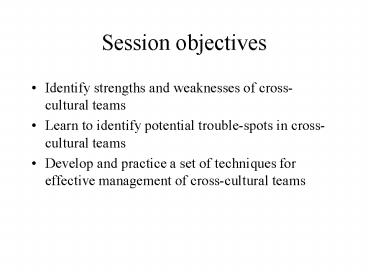Session objectives PowerPoint PPT Presentation
1 / 11
Title: Session objectives
1
Session objectives
- Identify strengths and weaknesses of
cross-cultural teams - Learn to identify potential trouble-spots in
cross-cultural teams - Develop and practice a set of techniques for
effective management of cross-cultural teams
2
Experiential exercise The new plant site
- You will be asked to work first in a
single-culture team to determine the best site
for a new plant - You will then be asked to work in a
multi-cultural team to make the decision
3
You are no longer students!
- Imagine this is a real business situation
- Please try to stay in character as best as you
can - But, please try to work effectively in your team
4
Cross-cultural teams have strengths and
weaknesses
- Strengths
- Innovative ideas
- Diverse information
- Minimization of group-think
- Wide-spread commitment
- Weaknesses
- Process loss (actual productivity potential
productivity - loss due to faulty process)
5
Advantages of multicultural teams
- Diversity permits increased creativity--more
perspectives more ideas less groupthink - Diversity forces enhanced concentration to
understand others ideas, arguments - Increased creativity--gtbetter problem definition,
more alternatives, better decisions - Teams become more effective
6
Disadvantages
- Lack of cohesion caused by
- mistrust (lower interpersonal attractiveness
stereotyping more within-culture conversations)
miscommunication and stress (tension, less
agreement) - Inability to validate ideas, gain consensus, take
concerted action - Teams become less efficient, less productive
7
Balance of cultures critically important in
cross-cultural teams
- Tokens who deviate from group norms tend to be
ostracized - Tokens tend to be stereotyped
- Tokens tend to be less-listened to
- IMPLICATIONS
- Avoid tokens in group composition
- Build in explicit procedures to allow minority
voices to be heard
8
3 critical tasks in team management
- Structure the task
- What is the objective?
- What is the time frame?
- What are the resources available?
- Set the norms
- How will we communicate?
- How will we present information?
- How will we make decisions?
- Build team emotional intelligence
- aware of the emotions of its members and work
with these emotions
9
All of this takes time!
10
Cross-cultural teams Before the first meeting
- Prepare !
- get to know other team members
- circulate agenda and materials
- set a concrete goal and obtain team buy-in
- make sure that the team has the appropriate
resources, training and authority - Decide whether or not your team requires a leader
- base decision upon corporate culture and national
culture - Be conscious of mix of nationalities
- avoid tokens
11
Cross-cultural teams The first meeting
- Teams that start out right get better over time.
- Teams that start out badly are difficult to turn
around. - Build relationships before getting to work.
- Set norms for teamwork.
- promptness, interruptions, presentation of data,
decision-making - Set norms for equal participation.
- Provide written summaries of team proceedings.

